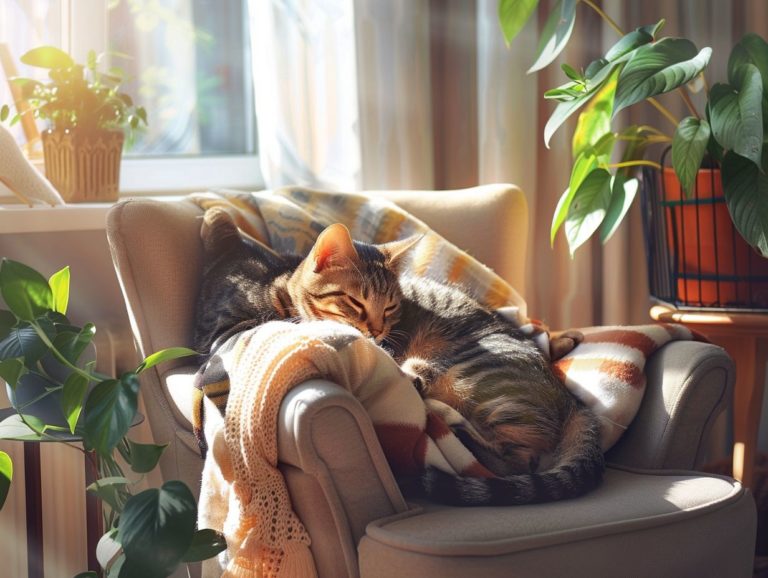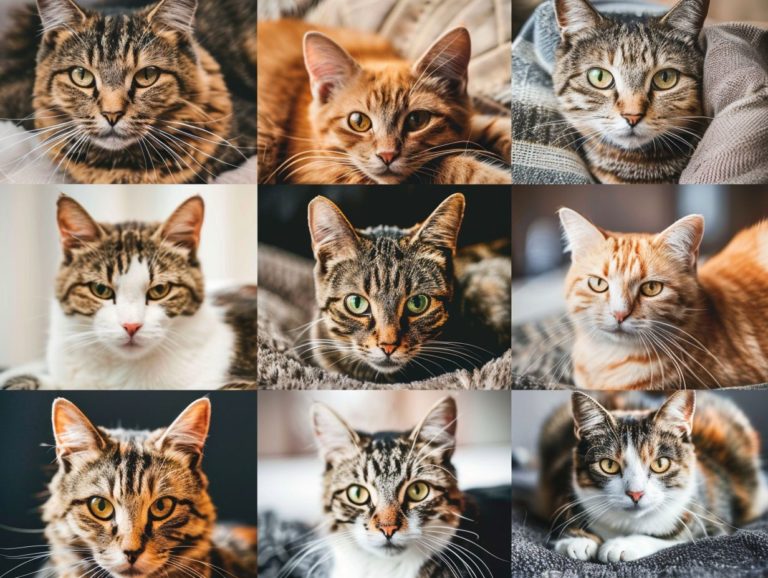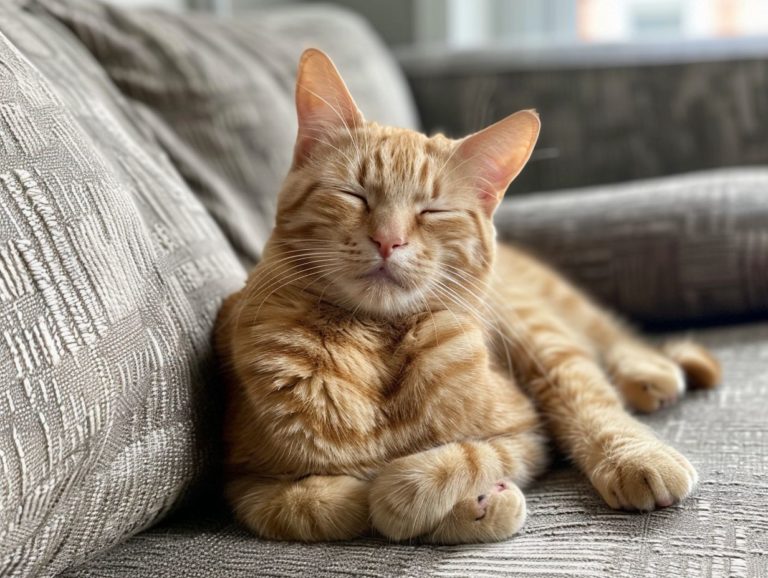Indoor Cat Insurance For Rare And Exotic Breeds
This article delves into indoor cat insurance, defining what it is, describing the various types of coverage available, and outlining factors to consider before buying a policy.
It then goes on to explore selecting the appropriate insurance provider, additional considerations for rare and exotic breeds, and offering tips for maintaining the health of indoor cats.
Key Takeaways:
Understanding Indoor Cat Insurance
Indoor Cat Insurance pertains to the coverage options available for your feline companions, whether they are purebred Persians or playful tabbies. This insurance ensures that your beloved indoor pets receive the best veterinary care and medical attention. Feline pet insurance for indoor cats, such as Nationwide, covers everything from routine check-ups to unexpected emergency situations, offering various coverage options.
Policyholders can choose policies that cover illnesses, accidents, and hereditary conditions, enabling them to provide quality healthcare for their indoor cats without financial concerns. Selecting the appropriate policy for your indoor pet depends on factors like deductible amounts, coverage limits, and reimbursement percentages, tailored to suit the specific needs and circumstances of your indoor cat.
What is Indoor Cat Insurance?
Indoor Cat Insurance is a type of pet insurance policy that covers veterinary care, illnesses, and accidents for indoor cats. Companies such as Nationwide Pet Insurance offer insurance programs tailored to help cat owners protect their pets. Indoor Cat Insurance provides financial support for policyholders in the event that their indoor cats require medical treatment for unexpected illnesses or accidents.
Common coverage options include reimbursement for diagnostic tests, medications, surgeries, and hospitalization. Indoor Cat Insurance can safeguard against the financial burden of high veterinary bills, allowing pet owners to provide the best care for their beloved pets without concerns about costs.
Coverage for Rare and Exotic Breeds
Insurance coverage for Rare and Exotic Breeds extends beyond traditional cats and dogs to include rare and unusual reptiles, mammals, and birds. Proper exotic pet insurance or liability coverage is crucial for ensuring the health and safety of these exotic animals.
Due to the specialized needs of exotic animals, such as reptiles, mammals, and birds, they require specialized types of coverage to safeguard them against their unique risks and health requirements. For instance, reptiles may need exotic disease coverage or insurance for exotic veterinary services, while rare birds may necessitate insurance protection against aviary accidents or coverage for unexpected medical expenses.
Pet owners can navigate this intricate terrain most effectively by identifying insurance providers that offer policies specifically tailored to the distinctive characteristics of exotic pet species, providing appropriate and comprehensive coverage to protect both the pet and its owner.
Types of Coverage Available
Pet insurance offers various types of coverage, including veterinary care, illnesses, accidents, and other options such as reimbursement, deductibles, and claims processes.
Typically, pet insurance policies cover veterinary care like annual check-ups, vaccinations, and preventive treatment. These policies may also include coverage for illnesses such as cancer, diabetes, or infections, as well as accidents like broken bones or poisoning.
Reimbursement is a key feature of pet insurance, where the pet owner initially pays the vet bills and then submits a claim for reimbursement. Deductibles represent the amount the pet owner must pay out of pocket before insurance coverage kicks in. The claims process usually involves submitting vet invoices and medical records for review and approval by the insurance company.
Factors to Consider Before Purchasing
Before purchasing pet insurance, it is crucial to consider costs, financial implications, and the reputation of insurers and insurance companies providing coverage. These factors should be given equal weight for policyholders to make informed decisions.
Evaluating the range of coverage options offered by different plans is essential. Understanding what each policy includes, such as medical treatments, emergency care, vaccinations, and routine check-ups, enables policyholders to assess the quality of coverage they will receive.
It is also important to investigate the insurer’s responsiveness in processing claims and addressing customer inquiries. Additionally, assessing an insurer’s financial stability and history of premium adjustments is vital in determining the reliability of the insurance company.
Costs and Benefits
For pet owners seeking to provide the best possible medical care for their pets, understanding the costs and benefits of pet insurance is crucial. Evaluating monthly expenses, coverage options, and available veterinary care is essential in selecting the most suitable insurance plan for your pet.
Monthly costs for pet insurance can vary depending on factors such as the pet’s age, breed, and existing health conditions. Some plans offer comprehensive coverage for accidents, illnesses, and routine check-ups, while others focus more on safeguarding against major medical expenses.
While the premium cost is important, pet owners should also consider potential savings on veterinary bills during emergencies or unexpected health issues. With good pet insurance, pet owners can have peace of mind, knowing they can meet their pets’ medical needs without facing financial strain.
Choosing the Right Insurance Provider
The best way to choose the right insurance provider for your pet is to assess each company individually, comparing their coverage options, customer service quality, and coverage limits against their reliability. Selecting a trustworthy provider can significantly impact your ability to effectively manage your pet’s healthcare costs.
Reputation: It is important to evaluate the reputation of an insurance provider before selecting a policy. Look for companies with a strong track record of processing claims in a timely manner and offering excellent customer service. Responsiveness to customer inquiries and concerns is a key aspect of quality customer service.
Coverage limits: Compare the coverage limits offered by different insurance companies to find the one that best suits your pet’s potential healthcare needs. Adequate and comprehensive coverage is essential for safeguarding your pet’s health without unexpected financial burdens.
Research: Conduct thorough research and explore various insurance providers to make an informed decision that aligns with both your pet’s health requirements and your budget.
Researching and Comparing Options
Researching and comparing insurance options for your pets involves collaborating with agents, brokers, and insurance companies to assess and compare various plans and coverage for your animals. It is important to grasp the specifics of insurance plans and their coverage for veterinary expenses. This understanding is essential for pet owners to make informed decisions.
By partnering with insurance professionals, pet owners can gain insights into the diverse policy options available in the market. Agents and brokers can offer personalized recommendations tailored to the requirements of their pets and simplify insurance terminology.
Direct engagement with insurance companies enables a comprehensive evaluation of premium costs, deductibles, copayments, and coverage limits offered by different plans. Through this collaborative effort, pet owners, agents, brokers, and insurance companies work together to give the power to pet owners in choosing the most suitable insurance plans to safeguard their pets.
Additional Considerations for Rare and Exotic Breeds
When insuring Rare and Exotic Breeds, it is important to consider specialized coverage and special requirements to ensure full protection. Properly insuring exotic pets necessitates a nuanced understanding of their unique needs.
One critical aspect to keep in mind is the significance of finding a policy that includes coverage specifically tailored for your individual animal, whether it be a reptile, mammal, or bird. Each species has distinct requirements that must be met by the insurance coverage. Factors such as habitat needs, breed-specific health issues, and the unique risks associated with owning rare animals all play a role in determining the most suitable policy to obtain.
Specialized insurers can offer policies that take into consideration these unique needs, providing the comprehensive protection necessary for your exotic pets.
Specialized Coverage and Requirements
Specialized coverage and meeting specific requirements for exotic pets involve selecting insurance plans that are specifically designed to cover their veterinary expenses, injuries, and overall well-being. This is achieved through various types of coverage tailored to meet the unique needs of exotic animals. These insurance plans are customized to address a range of needs for exotic pets, ranging from routine check-ups to emergency medical expenses.
Coverage options may include reimbursement for surgeries, medications, and specialized treatments. Some policies also provide protection for injuries resulting from accidents or unforeseen health issues. Wellness plans are structured to promote preventive care, such as vaccinations and regular health screenings, enabling exotic pet owners to ensure that their cherished companions remain healthy and content.
Tips for Maintaining Indoor Cat Health
Insurance policies for Indoor Cat Health are insurance plans taken out to cover medical and related expenses for indoor cats. Indoor Cat Health involves ensuring that your indoor cat is well cared for and always receives proper nutrition, exercise, and preventative care, including:
- Regular vet visits to monitor health and identify potential problems early
- Creating a safe and stimulating indoor environment with toys, scratching posts, and resting areas to prevent behavioral issues and keep the cat mentally active
- Offering a healthy, balanced diet suitable for their age and adjusted for any existing health issues
- Providing fresh water at all times to ensure proper hydration
Nutrition, Exercise, and Preventive Care
Maintaining the health of cats involves proper nutrition, adequate exercise, and regular preventive care. Collaborating with a reputable insurance company such as Prime Insurance Company is a vital aspect of ensuring comprehensive and optimal medical care for your cats.
A holistic approach, including providing cats with the right balance of nutrients through their diet, is crucial for their well-being. Regular exercise tailored to a cat’s age, weight, and breed not only preserves physical health but also offers mental stimulation.
Routine preventive care check-ups aid in early detection of potential issues. Partnering with insurers like Prime Insurance Company guarantees financial assistance for unexpected medical problems, enabling you to deliver the best possible care for your pets.
Frequently Asked Questions
What is indoor cat insurance for rare and exotic breeds?
Indoor cat insurance for rare and exotic breeds is a type of pet insurance specifically designed to cover the unique needs and potential health issues of rare and exotic cat breeds that are primarily kept indoors.
Why do rare and exotic breeds need indoor cat insurance?
Rare and exotic breeds often have specific and sometimes expensive health issues that may not be covered by standard pet insurance. Indoor cat insurance for rare and exotic breeds provides coverage for these unique health concerns.
What types of rare and exotic breeds are covered by indoor cat insurance?
Indoor cat insurance for rare and exotic breeds typically covers breeds such as Bengal, Sphynx, Scottish Fold, and British Shorthair, among others. It is important to check with your insurance provider to ensure your specific breed is covered.
What does indoor cat insurance for rare and exotic breeds typically cover?
Coverage may include preventive care, accidents, illnesses, hereditary conditions, and some forms of alternative therapy. It is important to review your policy to understand exactly what is covered.
Are there any age restrictions for indoor cat insurance for rare and exotic breeds?
Most insurance providers have age restrictions for enrolling in a new policy for rare and exotic breeds. However, some providers may offer policies for older cats, so it is important to research different options and compare coverage and costs.
How much does indoor cat insurance for rare and exotic breeds cost?
The cost of indoor cat insurance for rare and exotic breeds can vary depending on factors such as the breed, age, and health of your cat, as well as the coverage options you choose. It is important to research and compare different insurance providers to find the best coverage and price for your specific cat’s needs.




